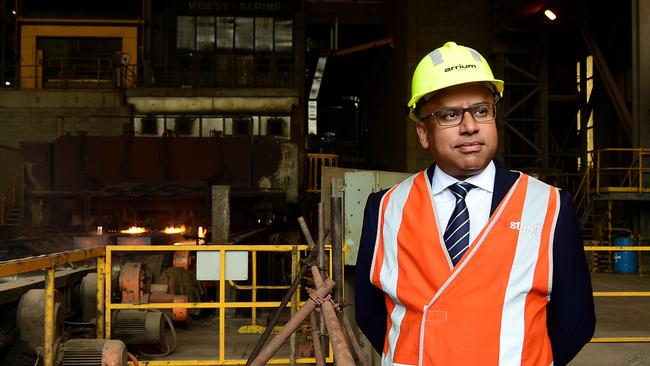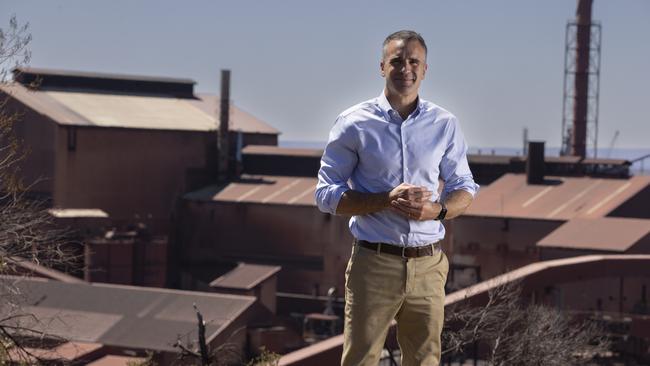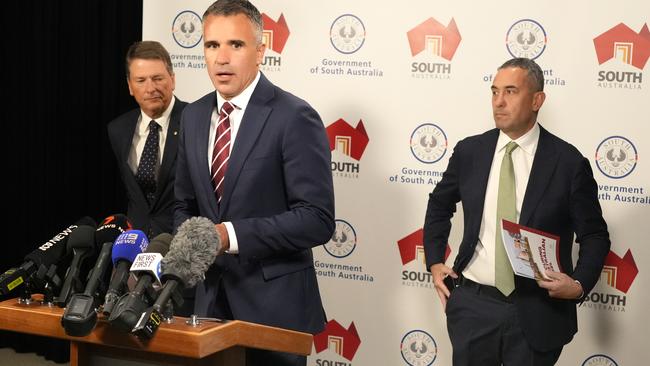Sanjeev Gupta has told staff putting the Whyalla steelworks into administration was ‘wrong’
GFG Alliance boss Sanjeev Gupta says the SA government was wrong to put the Whyalla steelworks into administration, but on the upside it would no longer be a drag on his empire.

GFG Alliance boss Sanjeev Gupta says the South Australian government was wrong to put the Whyalla steelworks into administration, but on the upside it would no longer be a drag on the rest of his global business.
Mr Gupta also said that GFG companies make up “the majority of creditors and including some that are secured’’, and that GFG was taking legal advice on its options around that debt.
He also said that the action of the South Australian government to push the steelworks into administration was the wrong move.
“I believe strongly that this is the wrong course of action for Whyalla’s creditors, employees and the wider community who now face a very uncertain future,’’ he said.
“We have our critics in Whyalla, but we have invested around $1.5bn since we owned the business, and the steelworks remains a net beneficiary of the group.
“In the last year alone, we have supported Whyalla to the tune of nearly $500m to keep operations going during the global downturn in steel markets.

“While I care deeply about Whyalla and believe in its future potential, the cost to the group has been huge, and we will no longer need to use our resources to cover those losses.
“My intention is to continue to pursue options to raise capital at Tahmoor, debt and equity, to support the operations and growth of this tier one asset.
“In the short term, this will make our Australian businesses stronger and gives us a better foundation to grow in future and deliver other strategic projects.
“I know this news will be disappointing to us all, not least to me personally, given the huge efforts we have all put in to save Whyalla in 2017 when it was losing $1m a day, return operations in 2024 after a near-death experience, and promote Whyalla’s magnetite potential to a global audience.
“However, we remain strong and determined to move forward with our most profitable assets in place.’’
Mr Gupta’s other Australian businesses include the Tahmoor coking coal mine, which he recently announced would be put up for sale, and is expected to fetch about $800m.
GFG also owns scrap recycling and long steel products company Infrabuild, which is profitable, albeit heavily indebted.
Mr Gupta said the Whyalla administration would not affect GFG’s other Australian entities.
“I’d like to stress that this development is isolated to Whyalla and does not impact other businesses within Liberty Primary Metals Australia, including Tahmoor Coal and Liberty Bell Bay, and it does not affect InfraBuild which remains strong, well capitalised and continues to operate as normal,’’ he said.
“InfraBuild has a robust supply chain and an already diversified billet supply from quality international mills in addition to its own local electric arc furnaces, which means it will continue to serve its customers with the high-quality steel products it produces.’’
Ratings agency Moody’s recently warned that Infrabuild was at risk of defaulting on a covenant over $US550m ($877m) in debt, which could be triggered if Infrabuild does not file its already-delayed financial accounts before the end of March.
Liberty Primary Metals Australia, which operates the Whyalla steelworks, and long steel products maker InfraBuild, have both so far failed to file their 2024 financial year accounts by the end of December as required.

It is understood the companies were waiting on the finalisation of a global deal with the creditors of GFG’s former financier Greensill, which Mr Gupta said last week had now been agreed, but not legally finalised.
Moody’s earlier this month downgraded InfraBuild’s credit rating to Caa2 from Caa1, with both ratings indicating a very high credit risk.
“InfraBuild’s fiscal 2025 first-quarter results were below our expectations, with reported revenue and earnings before interest, tax, depreciation and amortisation falling 10 per cent and 55 per cent year-on-year, respectively, as Australia’s sluggish residential activity and competition from imports continue to impact steel volumes sold while steel prices and global spreads remain relatively low,’’ Moody’s said.
“Although we expect some EBITDA recovery, the pace and magnitude of this remains uncertain, and we expect the steel operating environment to remain challenging throughout 2025.’’
Moody’s said it considered InfraBuild’s capital structure to be unsustainable “given its materially high interest burden, which along with its decline in earnings, will result in ongoing cash burn over the next 12–18 months’’.
“InfraBuild has flagged potential asset sales, including its US recycling assets, which if executed will support short-term liquidity,’’ Moody’s said. “Should the company fail to execute on these asset sales, we expect that without a significant turnaround in operating performance, the company will breach its month-end liquidity covenant under the asset-backed term loan agreement.
“We understand that as part of the amendments executed in October 2024, InfraBuild will be allowed to draw on a portion of funds held in escrow should a breach occur …’’




To join the conversation, please log in. Don't have an account? Register
Join the conversation, you are commenting as Logout